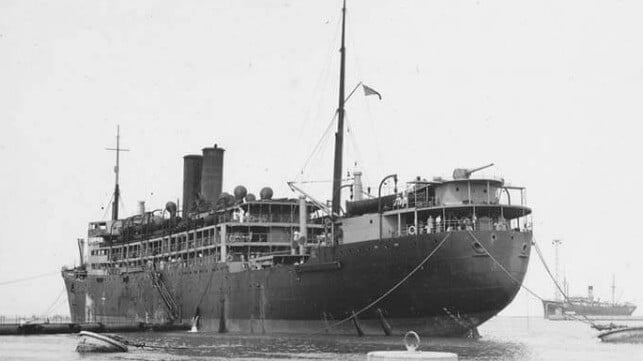UK Supreme Court Decides Case Over $43M of Silver from WWII Shipwreck

South Africa has won a long-running legal battle against a United Kingdom company over a silver treasure valued at $43 million that was salvaged from the wreck of a commercial ship sunk by the Japanese during World War II. The ss Tilawa is said to be the only cargo-passenger liner attacked in the Indian Ocean during World War II and has become known as the “Indian Titanic” due to the loss of 280 people.
The UK Supreme Court issued the verdict on the case after a British company Argentum Exploration laid claim to the silver that was recovered from the seabed in 2017. The company sought to be recognized as the voluntary salvor meaning that it could seek compensation for the recovery.
The silver bullion was part of the cargo that sank to the bottom of the ocean when the merchant ship Tilawa was hit by two torpedoes from a Japanese submarine on November 23, 1942. The silver was sold by the government of India and being transported to the South African mint to be used for coinage.
Built in England in 1924, the 137-meter (450-foot) vessel was owned by the British India Steam Navigation Company. The passenger/cargo liner was sailing from Bombay (Mumbai) India to Durban, South Africa carrying 732 passengers, 222 crew, and 6,472 tons of cargo, including 2,364 bars of silver bullion when it was hit.
A total of 280 passengers and crew died while 687 passengers were rescued by two ships nearby. The incident has been described as one of the deadliest in history, resulting in the ship frequently being called the “Indian Titanic.”
Argentum, a company owned by hedge fund boss Paul Marshall, organized the salvage operation after the wreck was located in 2017. It deployed the salvage vessel the MV Seabed Worker to lift the bullion at a depth of approximately 2.5 kilometers (1.5 miles) from the seabed. The silver was transferred onto another vessel, MV Pacific Askari, and transported to the UK, as Argentum believed the silver belonged to the UK government. The company went ahead to declare the find to the Receiver of Wreck as required by the Merchant Shipping Act.
A legal battle ensued after it was determined that the silver was the property of the South African government. Argentum sought compensation for the recovery. Under maritime law, it is possible to make a claim for voluntary salvage, which means a salvor can make a claim regardless of whether the owner of the property requested or consented to the salvage operation.
Initially, the High Court and Court of Appeal in the UK ruled in favor of Argentum, which argued that the silver was “in use or intended for use for commercial purposes” when it was being carried at sea in November 1942. South Africa as a foreign state sought sovereign immunity.
In its ruling, the UK Supreme Court held that the silver was not in use nor intended for use for commercial purposes. “Therefore, South Africa is entitled to immunity from Argentum’s claim against the silver,” said the judges in the 45-page ruling.

that matters most
Get the latest maritime news delivered to your inbox daily.
The judges held that the silver was procured for the production of coin for both the Union of South Africa and Egypt and that it was likely that the greater part of the consignment on board the vessel would be used for Union coinage. The intended use of the silver was therefore for a predominantly sovereign purpose. Last month, the two sides however reached a confidential, out-of-court settlement.
The case also helped to renew attention on the tragic plight of the Tilawa. Two organizations, the S.S.Tilawa Foundation and Tilawa 1942 seek to preserve and tell the story.
